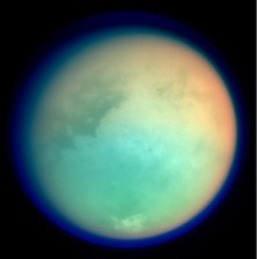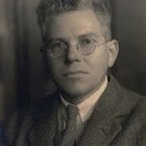 One of the things which most fascinated me as a child was the moon of Saturn known as Titan. Back then, relatively little was know about Titan but, with the Cassini/Huygens mission, far more is known about this enigmatic moon. Titan, a cold little place at -180C, has many interesting features which make this moon stand out from the crowd. It is bigger than Mercury and Pluto, and it's atmosphere is thicker than that of the Earth. It's core is rock, or possibly a rock and iron mix, its mantle and crust composed mainly of water, and its surface a thin layer of hydrocarbons. Scientists think that, under the mantle, there may even be an ocean of water and ammonia. On Earth, the stratosphere is composed of Ozone, and it is this which soaks up the solar radiation. On Titan, the stratosphere is composed of hydrocarbons. This haze, which characteristically surrounds the planet, was originally thought to be made up of lighter hydrocarbons, such as ethane. Since Huygens, however, we now know that there are much heavier compounds there, such as benzene. This abundence of hydrocarbons is important because scientists now believe that methane plays the role of water on Titan. The temperature of Titan is close to the triple point of methane (the point where the solid, liquid and gaseous phases can co-exist) just as the temperature of Earth is close to the triple point of water. There is also possibilities of a hydrologic cycle, though one far more extreme than that of Earth's, which has centuries of drought interspersed which massive downpours. Cassini observed areas ofthe surface of Titan darken after clouds passed over, suggesting rainfall. According to Ralph Lorenz and Christophe Sotin of Scientific American: "Titan is to the hydrologic cycle what Venus is to the greenhouse effect: a terrestrial process taken to extremes." Some further reading: www.scientificamerican.com - March 2010 issue: The moon that would be planet (you must either buy the issue or subscribe to get the full article) http://solarsystem.nasa.gov/planets/profile.cfm?Object=Sat_Titan - Nasa site: Titan http://www.esa.int/SPECIALS/Cassini-Huygens/SEMKVQOFGLE_0.html - Cassini/Huygens mission with video of the landing on Titan http://saturn.jpl.nasa.gov/index.cfm - The Cassini Mission http://www.lpl.arizona.edu/~showman/publications/mitri-etal-2007-lakes.pdf - Hydrocarbon Lakes on Titan
0 Comments
|
Categories
All
Archives
November 2013
|
MOST VIEWED POSTS
© James Edward Hughes 2013
 RSS Feed
RSS Feed





